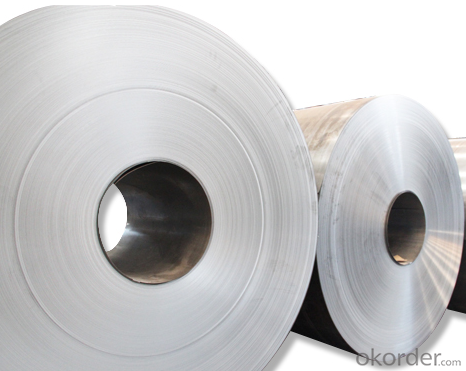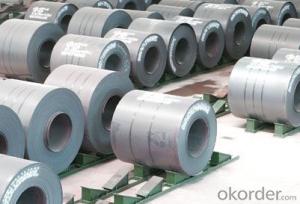Hot Dipped Galvanized Steel Coils CNBM
- Loading Port:
- Guangzhou
- Payment Terms:
- TT OR LC
- Min Order Qty:
- 20 m.t.
- Supply Capability:
- 3000 m.t./month
OKorder Service Pledge
OKorder Financial Service
You Might Also Like
1.Quick Details:
hot dipped galvanized steel coil
Material: | SGCC, DX51D+Z |
Thickness: | 0.13-0.8mm |
Width: | 750-1250mm |
Zinc coated: | 40-180g/m2 |
Standard: | ASTM,AISI,DIN,GB |
Spangle: | Zero Spangle, Regular Spangle, Small Spangle |
Surface treatment: | chromated and oiled, chromated and non-oiled |
Technique: | cold rolled galvanized |
Grade: | Prime |
ID: | 508mm or 610mm |
Coild weight: | 3-5MT/Coil or as your request |
Quality: | Softy , half hard and hard quality |
2.Packaging & Delivery
Packaging Details:Fully seaworthy export packing. Each coil is wrapped in water-proof paper.Fixed with steel strips.
Delivery Detail:about 12 days
3.Festure:
Certificate: | ISO9001, BV test |
MOQ: | 20MT |
Supply Ability: | 3000MT/month |
OEM: | Accept |
Price Item: | FOB, CFR, CIF |
4.Specification:
Standard | EN 10327 | DX51D+AZ, DX52D+AZ, DX53D+AZ, |
EN 10326 | SS250GD+AZ, SS350GD+AZ | |
JIS G3321 | SGLCC, SGLCD, SGLCDD, SGLC 400 | |
ASTM A792M | CS type C, CS type B, DS, SS255, SS345 | |
Base Metal | Cold rolled steel coils SPCC, SPCD, SPCE, DC01, DC03, DC04, CS, DS, DDS, Q195, Q250, Q350 | |
Thickness | 0.22mm-2.0mm | |
Width | 700mm-1300mm | |
Coil ID | 508mm, 610mm | |
Zinc coating | 60g/m2-180g/m2 | |
Surface treating | chromium free passivation, chromium passivation, fingerprint resistant, oiled | |
Spangle types | regular spangle | |

5.What is the application of Steel Coil?
There are two sides,one is out side: Workshop, agricultural warehouse, residential precast unit, corrugated roof, roller shutter door, rainwater drainage pipe, retailer booth;the other is inside: Door, doorcase, light steel roof structure, folding screen, elevator, stairway, vent gutter.
- Q:I have a job where I'm required to wear ANSI certified steel toed boots or shoes(so long as its ANSI). Thing is, I'm a vegan. I do NOT want to buy leather, and I will go to great lengths to buy a non leather shoe/boot I can wear on the job! I AM currently borrowing my dad's leather ANSI boots, but would very much love to be able to rock a pair of cruelty free boots/shoes on the job!It does not have to be certified vegan just all man-made materials and no leather/sued and other such stuff where animals have to die. It would make me no better than the massive slaughterhouse industries and such. Valueing money of ver live/morals. I don't want one of the first things I need to do in my manufacturing job is compromising my morals. :3So if you know of an ANSI vegan friendly boot brand PLEASE TELL ME! *gets on knees begging*Money isn't really an option for me, I'll just continue borrowing my dad's boots till I save up enough!Thanks in advance! :D
- Vegan okorder /... I don't know if they're ANSI shoes, so you might want to ask.
- Q:How do steel coils perform in extreme weather conditions?
- Steel coils are highly durable and resistant to extreme weather conditions. They can withstand intense heat, freezing temperatures, heavy rain, and strong winds without losing their structural integrity or performance.
- Q:How are steel coils cut to size?
- Steel coils are cut to size using a process called slitting, where the coil is fed through a series of rotating circular blades that make multiple cuts along its length. The blades are spaced at specific distances to achieve the desired width, and the cut strips are then rewound into separate coils.
- Q:hi to every one I need to konw moer about steel and iron industry (process) thank you in advance for your intresting
- Steel is made from injecting air into molten iron
- Q:How do steel coils contribute to the renewable energy sector?
- The renewable energy sector benefits from the utilization of steel coils in multiple ways. To begin with, wind turbines rely on steel coils for their construction. The towers of these turbines are crafted using steel, and structural components are fabricated from steel coils. The exceptional strength and durability of these coils enable them to withstand the harsh environmental conditions commonly found in wind farms. Furthermore, solar panels also depend on steel coils during their production. Steel is utilized to create frames and support structures that securely hold the panels in place. These frames must possess sufficient strength to endure various weather conditions, and steel coils offer the requisite stability and robustness. Additionally, steel coils are essential in the development of transmission lines that transport electricity generated from renewable sources. Steel is widely employed for constructing the poles and towers that support these transmission lines, as it affords the necessary strength to bear the weight of the cables and endure extreme weather conditions. Moreover, energy storage systems, which play a crucial role in storing surplus energy from intermittent renewable sources like wind and solar, are heavily reliant on steel coils. Battery enclosures and racks are fabricated using steel coils to ensure the safety and stability of these systems. In summary, steel coils make a significant contribution to the renewable energy sector by providing the strength, durability, and stability required for various infrastructure components. Their utilization in wind turbines, solar panels, transmission lines, and energy storage systems supports the growth and advancement of renewable energy sources, thus establishing them as an indispensable element in the transition towards a greener and more sustainable future.
- Q:How are steel coils cut into smaller sizes?
- Steel coils are cut into smaller sizes using a machine called a slitting line. This machine employs a set of circular blades that cut through the steel coil, creating narrower strips or sheets of the desired size. The slitting line can adjust the width of the cuts and can also remove any rough edges or burrs.
- Q:will peircers use surgical steel? how do you know for sure what they are using?
- Most reputable piercers will use surgical steel. You can ask them beforehand and they will let you know what it is they are piercing you with. You can go out and buy a ring of your own and have them sterilize and use that to Peirce you with. Like I said though, most places do use surgical steel. I wouldn't worry too much. :) Just make sure you ask to be sure. Good luck!
- Q:Steels like YHB-2, MVS-8, and SK-5. Also if you know anything about these steels that would be helpful.
- White steel is a common shorthand name for white paper steel (shirogami hagane) which can be any of several fairly simple high carbon, water hardening steel grades. The carbon content varies by grade, and runs from 0.8 to 1.4%. The range of carbon content within a grade is a tight 0.1%. For example, the carbon content of Shirogami Hagani No1A is specified to be between 1.3 and 1.4%. Each grade also contains 0.1-0.2% silicon and 0.2-0.3% manganese, and only trace amounts of the impurities sulfur and phosphorus. Blue paper steel (aogami hagane) is also offered in several grades, with carbon content ranging similarly to the white grades. However, blue steel contains the additional alloying elements chromium and tungsten, and one grade (aogami super) also contains molybdenum and vanadium. The blue steels can be quenched in water or oil, whereas most of the white grades need a faster quench and require water.
- Q:What are the dimensions of steel coils used in the automotive industry?
- The dimensions of steel coils used in the automotive industry can vary depending on the specific application and requirements. However, typical dimensions for steel coils used in the automotive industry range from 0.5mm to 3mm in thickness and from 500mm to 2000mm in width. The length of the coils can vary depending on the production process and customer specifications. Additionally, the weight of the coils can range from a few hundred kilograms to several tons. It is important to note that these dimensions are general guidelines and can vary depending on the specific needs of the automotive manufacturer.
- Q:How do steel coils contribute to the marine industry?
- The marine industry heavily relies on steel coils due to their multiple uses that contribute to the advancement, upkeep, and effectiveness of marine vessels. Initially, steel coils are crucial in ship and offshore platform construction. Their exceptional strength and durability make them ideal for the hull structure, ensuring the vessel's integrity and safety, even in harsh marine conditions. Furthermore, steel coils find application in the production of various marine equipment and parts. For example, they are utilized in the manufacturing of propellers, shafts, and rudders, which are vital for steering and propelling ships. By using steel coils in these components, their ability to withstand the corrosive impact of seawater is ensured, thereby prolonging their lifespan and reducing maintenance expenses. Moreover, steel coils play a significant role in the fabrication of marine pipelines and infrastructure for oil rigs. These coils are transformed into pipes and tubes that are essential for transporting oil, gas, and other fluids. The strength and corrosion resistance of steel coils are crucial in guaranteeing the dependability and safety of these pipelines, as they must endure extreme pressure and exposure to saltwater. Additionally, steel coils are also involved in the maintenance and repair processes of the marine industry. Whenever a ship undergoes renovations or repairs, damaged or corroded sections are often replaced with steel coils. The versatility of steel coils enables them to be molded and welded into various shapes and sizes, making them suitable for diverse repair applications. Overall, steel coils make a substantial contribution to the marine industry by providing the necessary strength, durability, and corrosion resistance required for the construction, maintenance, and efficiency of marine vessels. Their utilization in shipbuilding, component fabrication, pipeline construction, and repair procedures renders them indispensable for the growth and sustainability of the marine industry.
1. Manufacturer Overview |
|
|---|---|
| Location | |
| Year Established | |
| Annual Output Value | |
| Main Markets | |
| Company Certifications | |
2. Manufacturer Certificates |
|
|---|---|
| a) Certification Name | |
| Range | |
| Reference | |
| Validity Period | |
3. Manufacturer Capability |
|
|---|---|
| a)Trade Capacity | |
| Nearest Port | |
| Export Percentage | |
| No.of Employees in Trade Department | |
| Language Spoken: | |
| b)Factory Information | |
| Factory Size: | |
| No. of Production Lines | |
| Contract Manufacturing | |
| Product Price Range | |
Send your message to us
Hot Dipped Galvanized Steel Coils CNBM
- Loading Port:
- Guangzhou
- Payment Terms:
- TT OR LC
- Min Order Qty:
- 20 m.t.
- Supply Capability:
- 3000 m.t./month
OKorder Service Pledge
OKorder Financial Service
Similar products
New products
Hot products
Related keywords




























